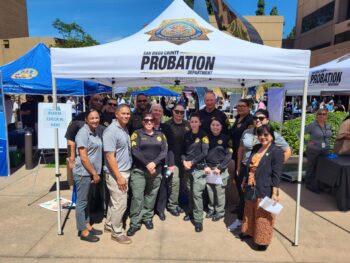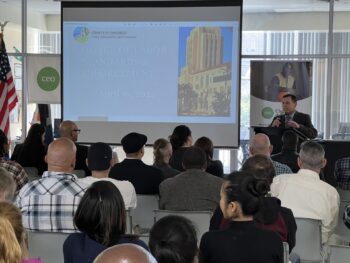She will handcuff new clients and will get help from another probation officer to search them for weapons or drugs. That’s standard procedure, but after that she makes every effort to establish a relationship based on mutual respect and accountability.
Deputy Probation Officer Ana Diaz Pina embraces a new kind of probation-officer guidance called Integrated Behavioral Intervention Strategies or IBIS. It calls for probation officers to counsel those on probation by talking with them about what circumstances and behaviors led to their trouble and what they want to do with their lives instead.
Recently, one of her clients, Carlos M., who has nearly completed probation, thanked her in a letter he wrote to her supervisors to let them know how she had made a positive difference in his life.
“I was previously under the care of another County Probation Department, and was having a bit of a difficult time. When I moved to San Diego under the probation custody of South Bay’s Deputy Diaz Pina, I immediately felt and saw the difference,” he wrote. “In the past year I have turned my life around, stabilized myself in a home and job, and re-established a great relationship with my family and children, which I was previously unable to do.”
“I just motivated him and told him he could do it,” said Diaz Pina. “Every single time I saw him, I told him ‘Don’t give up, it’s hard but you can do it.’”
After that, he owned up to his crime and completed all the program referrals she required of him, Diaz Pina said.
“My probation Officer Deputy Diaz Pina demonstrated something I had never seen before while being under probation, which was a genuine concern and care. She kept me motivated to do well and improve my situation, which made it easier for me to complete the programs that were required,” Carlos M. wrote in his letter.
“One of the great things about Diaz Pina is she has a really open-minded approach to everybody,” said Supervising Probation Officer Jorge Gonzalez. “I try to pair individuals who I believe will benefit from her patient and open-minded approach.”
Gonzalez said he also relies quite a bit on her bilingual skills in pairing her with clients. He said she has a unique approach that does not come across as adversarial. She is fair but can also crack down on people who are violating the terms of their probation, he said.
Everyone deserves a second chance, Diaz Pina said. Nearly all the people on probation come from rough circumstances; many of them only know a world of gangs, drugs and violence. Diaz Pina said she grew up among poverty, violence and drugs just like they did.
The only difference between some of her clients and her is that she made a decision as a young girl – because of the love for her hard-working mother – not to take that path. Instead, Diaz Pina resolved to help those people who were ensnared in that lifestyle.
She tries to make her probation clients see beyond their circumstances. She encourages them to consider college and a better life that could include travel or other positive experiences.
So, when she first meets her clients, she tells them she is going to hold them accountable but she is also going to help them with their rehabilitation process.
As part of her assessment, she asks them why they are there and they tell her they are on probation for various crimes. She then asks why that happened. This makes them dig deeper and that’s when they reveal substance abuse or physical abuse issues, which are all things that Diaz Pina can help with. She isn’t a therapist, but she refers them to social service programs that can help with issues like anger management, drugs or whatever may be at the root of the problem.
She also believes strongly in support systems, so she also asks them who is in their life. Then she goes a step further encouraging her clients to bring those people with them on their next visit. This involves all the people who care about the person on probation and helps them learn how to help, she said.
Diaz Pina said she tells them upfront what she expects of them and she tells them it’s going to be hard work and some days they will probably even hate her and feel she is overbearing, but in the end it will pay off.
“The discipline emphasized in this Probation program really helped keep me on track alongside of the weekly check-ins,” said client Carlos M.
“I feel that the staff is genuinely there to assist. I feel that the programs we are placed in really do help rehabilitate and make us grow as people. I can’t thank you all enough for the extraordinary work, dedication, and care that is given to all those on probation. Thank you for helping me get my life back on track,” he went on to say in his letter.
Diaz Pina humbly responds that while she is grateful that he wrote the nice letter about her, there are many probationers who verbally thank the other officers in her department. She says they all work together as a team and she could not be successful without them.
In particular, she said Gonzalez’s “leadership is what makes me want to be a better officer.”





